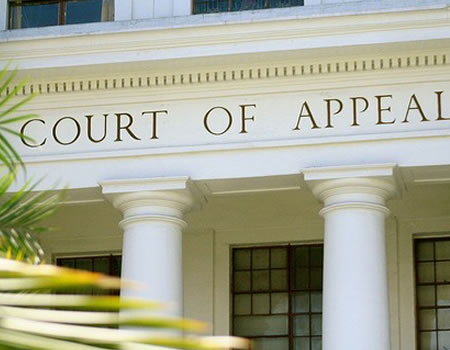This was as Justice Hyeladzira Nganjiwa, a serving Federal High Court judge, on Monday, had a cause to smile, as the Lagos Division of the Court of Appeal struck out the criminal charges filed by the EFCC against him.
The presiding judge, Justice Adejumo Obaseki, held that the arraignment of Nganjiwa by the EFCC was not in order.
The judge said the NJC must first perform its constitutional role of disciplining the judge after which it would then recommend him for prosecution.
It will be recalled that the EFCC had arraigned the judge for allegedly receiving a total of $260,000 and N8.65 million gratification to enrich himself as a public official.
The anti-graft agency arraigned the judge on 14 counts before the Lagos State High Court in Igbosere, on June 23.
Justice Nganjiwa had pleaded not guilty and trial had immediately commenced before Justice Adedayo Akintoye.
However, in a twist of events on Monday, the Appeal Court panel presided over by Justice Adejumo Obaseki, quashed the 14 charges pressed against Justice Nginjiwa.
The Appeal Court’s ruling followed an appeal filed by Justice Nginjiwa, through his lawyer, Chief Robert Clarke, challenging Justice Akintoye’s jurisdiction to entertain the charges.
On behalf of his client, the SAN had contended that by virtue of Section 158 of the 1999 Constitution, only the NJC had the power to deal with the kind of allegations brought by the EFCC against a serving judge.
But the prosecuting counsel for the EFCC, Mr Rotimi Oyedepo, disagreed and rather maintained that despite being a serving judge, Justice Nganjiwa did not have immunity against criminal prosecution.
“We must be bold enough to concede that the NJC has administrative power in the appointment and administrative discipline of a judicial officer. But Section 158 of the constitution did not clothe the applicant with immunity from criminal trial.
Ruling on Justice Nganjiwa’s objection, Justice Akintoye had upheld Oyedepo’s argument, while Clarke headed for the Appeal Court.
Reacting, the EFCC said it would appeal the ruling.
In a statement on Monday, spokesman of the EFCC, Mr Wilson Uwujaren, said the commission considered the ruling as a “dangerous precedent that has no basis in law.”
Uwujaren said the EFCC was confident that the Supreme Court would upturn the judgment.
“Criminal trial takes precedence over administrative procedures and it is strange that the Court of Appeal wants to put the cart before the horse.
“This is ridiculous. The appellate court simply wants to confer immunity on public officers from prosecution for corruption; it will not stand,” he said.






